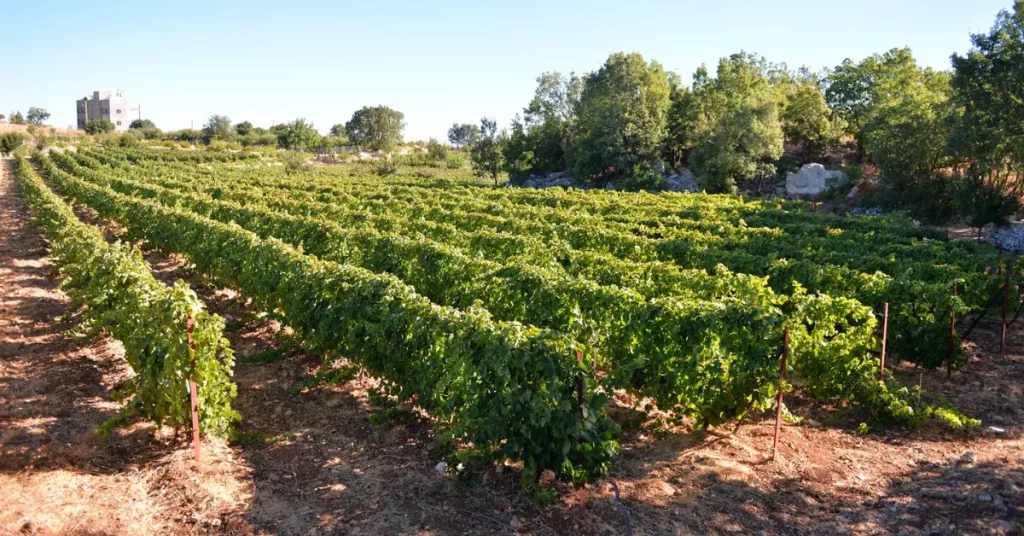Karam Wines was founded in 2002 by Habib Karam, a retired airline captain, in his beloved hometown of Jezzine, South Lebanon. The winery was the first to plant wine grapes in this region, producing red, rosé, and white wines and arak made solely from local Lebanese indigenous grapes.
We speak to Thouraya Karam, who left her job as an auditor for Ernst & Young to join Karam Wines and become the Operations Manager for this family business that has recently added a brilliant innovation to its lines: Jezzignac, a grape-based Eau de Vie or the local version of Cognac.
Can you start by introducing Karam Wines?
Karam Wines is a Lebanese family-run and operated business. Our vineyards reside at high altitudes, up to 1,400 meters above sea level, facing the Mediterranean Sea within the Jezzine district. The geological diversity in the South allows for the harvesting of different grape varieties. We mainly harvest our grapes from the region with the help of the farmers in the area and use indigenous varieties such as Meksassi, Hifawi, Zawtarani, and Baitamouni.
Karam Wines produce 13 wines alongside a premium Arak and have just launched our Jezzignac.
Who is the target audience for Karam Wines beverages?
Karam’s selection caters to several consumer segments. Our beverages cater to people who value crafted artisanal products. Yet, our product range is wide to accommodate different consumer tastes. It is a firm belief in the Karam family that wine brings people together. We desire to unite people in moments filled with laughter, joy, and love.

Jezzignac sounds very interesting. How do you make it?
We released the Jezzignac in 2021, using indigenous grape varieties to produce it. It’s a grape-based Eau de Vie named after Jezzine and holds this area’s legacy. Our Jezzignac is aged for fifteen years in oak barrels and glass jars.
After dinner, a glass of Jezzignac would be perfect, especially if the weather outside is nippy.
Where is Jezzignac available, and are you considering exporting it?
Fans can find our Eau de Vie in some supermarket chains, delicatessen shops, and wine boutiques all over the country. Although we already export wine and arak, we have not shipped Jezzignac yet, but we’re on the right track. Since its release, Jezzignac has been doing great in the local market and consumers have received it very well. We plan to expand in the Lebanese market first, then plan to export.
How would you summarize the export process?
The export process and documentation are feasible, especially if you are supported by someone who has been through it before. For Europe, there are standard forms and testing to be filled out; other documentation applies to countries outside the European Union (EU). For example, we should register the product with the Food and Drug Administration (FDA) to be able to access the US. Other countries require additional testing for the products. If any additional paperwork is needed, our clients communicate it with us beforehand.
What certifications and awards have you received?
We’ve won wine medals, awards, and product reviews from internationally reputable sources. The latter is essential, as it gives credibility and recognition to your brand, especially in business deals. Honestly, whenever a consumer enjoys our spirits, it feels like another accomplished achievement.
We know that local producers suffer from the lack of local packaging; how do you deal with that?
Karam Wines has established long-standing relationships with its suppliers over the years. We import bottles, capsules, corks, etc. If we are looking for an item not available within the range of our suppliers, we then research where to find it. Attending fairs and expos is always a good idea to find new suppliers. The packaging process is one of our primary focuses, which takes time and research. It plays a significant role in portraying the brand identity and can significantly affect the perception of the product in the consumer’s eyes.
Was there a direct impact led by the economic crisis on your products?
Before discussing the economic crisis, the COVID-19 pandemic noted a surge in alcohol consumption during confinement, especially in the wine sector. In the early stages of the financial crisis, wine/spirits import decreased, and therefore, attention shifted to locally produced alcoholic beverages. As purchasing power in the country fell, consumers deviated from imported products to locally produced ones. Why not? Lebanon is home to the finest wines and spirits!
What are your plans for the future?
In regards to Jezzignac, Karam Wines plans to release older vintages. For the other types of spirits produced, Karam aims to increase production on all fronts, grow in the local market and expand international reach.
What role did QOOT play throughout this journey?
QOOT is essential on many levels. It creates linkages within the agri-food sector alongside innovators who are present all over the country but would never meet otherwise. The cluster connects Lebanon’s regions in one place and one group, and that’s how improvement initiates. QOOT combines information and experience from each member, and that contributes to solving many problems, especially since knowledge is the key to success. The best part is that this knowledge is an open resource. QOOT also informs you of opportunities to grow your business, focusing on export markets. We are grateful to be part of QOOT!
What would your advice be for other local innovators?
My advice to other local innovators is “always to push through no matter what happens.” Every day is a surprise, and there will be incidents or hiccups that might affect the plan. The country’s circumstances have been challenging, but no matter what, pushing through and moving forward is the only way to blossom. Cheers!







